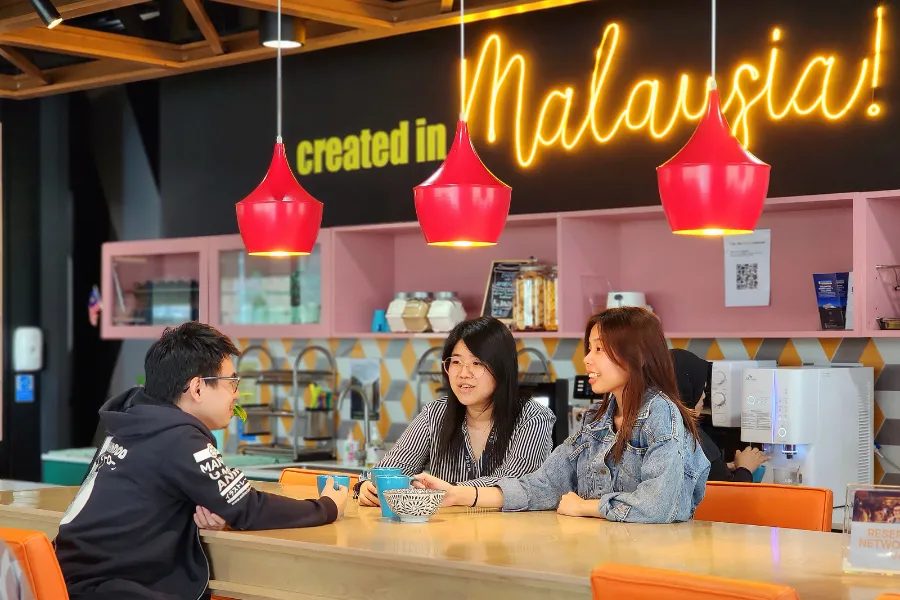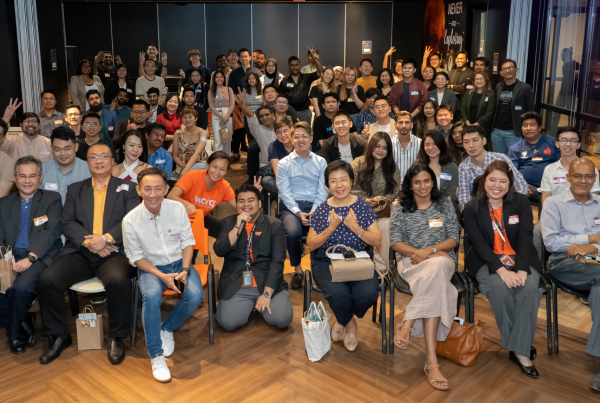KUALA LUMPUR, 19 January 2022 – CEO and Co-founder of WORQ, Stephanie Ping, was interviewed in Astro Awani. On Notepad with Ibrahim Sani, Stephanie shared her takes on mainstreaming co-sharing office culture in Malaysia and the trend for the past few years. During the interview, Stephanie explained that WORQ sees coworking spaces as a flexi-lease office with a thriving business community that increases productivity. Communities are usually built in the space and that opens more opportunities to create more networking.
Malaysia has jumped to the trend of coworking culture, and ever since, there have been a lot of changes in the industry. Ibrahim Sani spoke with Stephanie to find out more.
15 key trends in coworking space in Malaysia
Are there any troubles in establishing the coworking business post-pandemic?
The pandemic had a significant impact on us as well as our clients. As a measure of that, we tried our best to help our clients. Throughout the pandemic, we were profitable, so we were able to help clients financially to survive. We do this by giving them rebates.
Post-pandemic, people are seeing coworking spaces as solutions, as our occupancy is at 90 percent and there are still more on our waiting list. It is a very flexible working space, and it gives them the agility they want.
What is the duration of the leases at WORQ?
WORQ is a very flexible coworking space, and we aim to make tenants feel less burdened in terms of the leases. The timeline for our clients ranges from a day to three years. The majority of the tenants opted for a year, and a lot of them also opted for the three to six months duration.
What are the differences between the coworking market in Malaysia and internationally?
Coworking spaces are used throughout the world, and some countries have adapted this workstyle for ages. Malaysia itself is lagging behind the market, currently, only 1 percent of offices are used as coworking spaces. It is far behind other countries in Asia, where the average office space used for coworking is 3 percent. Moving forward, it is expected that Malaysia will close the gap and increase the use of coworking spaces.
Should Malaysia move to be on equal footing with the international coworking market?
As the pandemic ends, companies are trying to grow their businesses. Companies are scaling and hiring, but they are unable to determine how many people they should have. In this case, they have to be agile. We provide a way for them to make the process easier and less risky, so they are able to react instantly.
How do the clients decide to go for WORQ instead of other competitors?

WORQ has a mass market value model, just like selling Honda instead of Ferrari. Meaning, we are selling at a point where they don’t feel burdened for what they pay, and there are no unnecessary extra fees.
Clients choose the spaces based on the value they receive. Prices are important, but locations, amenities, and other factors also play a role. We maintain our services while controlling costs so that clients don’t pay for unnecessary things. The market itself is in high demand as we open our 5th outlet in KL Sentral, and before we launched, it was already fully occupied.
How are you managing your capital and cash flow at WORQ?
In terms of raising our capital, we’ve raised 3 rounds of funding and got a loan from big banks with very favourable terms due to our strong financial profile. Even during MCO, we were quite relaxed, as our finances are strong to the point where we’re able to help our clients.
What are the risks in the coworking industry?
Coworking spaces weren’t as famous back then, and this industry wasn’t yet mainstream. At first, a lot of tech companies and startups used it, but slowly it became a trend. According to CBRE, 7 out of 10 companies will be using coworking spaces, and Malaysia will hop on the trend.
What is the situation for office spaces in Malaysia?
In 2015, there were 20 million square feet of unused office space, and that rose to 33 million in 2022, which is just seven years later. As this “office space glut” worsens, landlords are seeking help to create a coworking space in their building that acts as an amenity for their clients.
As of now, startups, as well as industrial giants, are seeking coworking spaces, aligning with landlords wanting to revive their space. Everything’s converging, and it’ll soon grow into a bigger market.
Are competitors more aggressive? How does WORQ stand amongst competitors?
In terms of aggressiveness, we built the very foundation of our business to be very sturdy. It’s strong enough that we can be aggressive yet sustain the business while making it profitable. This is the reason why banks are confident and supporting us, as we are profitable even during the pandemic.
In our last round of fundraising, we had seven follow-on investors who are very happy with their investments. As we have a strong financial foundation, we’re able to reinvest and launch new outlets.
What kind of clients are you trying to reach outside of the norm?
Coworking spaces can be used by all sorts of sectors. For instance, tertiary education institutions put their teams in our coworking space, such as their marketing and recruiting teams. This enables them to work closely with other organisations, as well as interact with younger generations.
Manufacturing companies also place their sales and marketing teams in our outlets. This is due to their factories being far away, and by having a base in our outlets, they are able to work nearer to the city.
Is it important for WORQ to have this cool/hip element to attract talent?

Having this cool/hip element in the working space is an important aspect. Alongside this comes the main key, flexibility. Opting for a coworking space enables you to be flexible, as people need amenities all over town, so they can be more productive. It will also create a community, in which consumers receive a nice working space with friends that support each other.
Would flexibility give a negative impact on companies that want their employees to be in a collaborative workspace?
This working style is advantageous to both the company and the employees. People work in various ways, and sometimes they might need a collaborative space for meetings or a quiet space for them to focus on tasks. Coworking spaces provide multiple kinds of spaces where people can choose how they want to work and increase their productivity.
What is the trajectory between WFH and working in a collaborative space?
The perfect mix of working from home and collaborating in a shared space is the 3-2-2 mix. It’s a mixture of working three days in the office, two days at home, and two days of rest. This work style should be tweaked based on the teams and their needs.
How does inflation impact your coworking clients?
Clients need to be agile as they’re not able to plan and take unnecessary risks like before, which could put them in financial trouble. They don’t want to make a strict commitment. Coworking spaces give them the flexibility they need to react quickly when things go south.
Is lowering the cost for the coworking clients part of the plan?
It has always been the plan to lower our costs while maintaining the same services and even more. Controlling the cost is an important factor. We try to give our clients all the necessary things, such as more meeting rooms, proper printers, and many more, but not to the point that it’s unnecessary. This will allow them to increase their productivity at a proper price.
We also ensure that there are many parking options available to reduce their time in traffic, as well as being right next to a train station. Our outlets are also spread out, so they are able to work from any outlet they want.
Moving forward, coworking spaces are the trend for working. It has become a mainstream way of working, and it will grow. The flexibility it provides will make employees happier, which may increase productivity and be good for our economy.
Watch WORQ interview on Astro Awani
WORQ puts forward agility and flexibility and, at the same time, becomes a community builder in Malaysia. As a community-centric organisation, WORQ focuses on helping companies increase their productivity. Coworking is going mainstream, and the market will grow larger within the overall real estate percentage.
If you are keen to know more about coworking trends in Malaysia, watch the full interview below.



